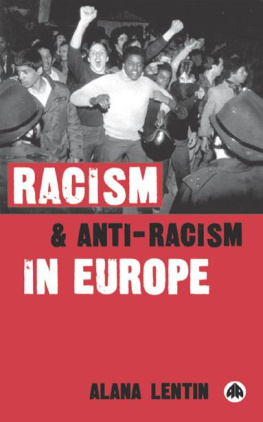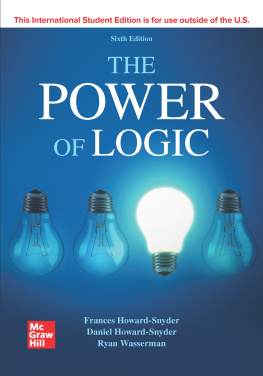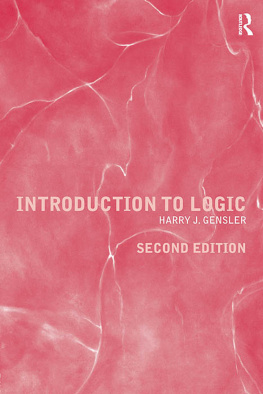Routledge Revivals
The Logic of Racism
First published in 1987, The Logic of Racism provides a portrait of race relations based on the stories of 800 different individuals from all sections of society. In this book, voices from the authors tape recorder are converted to the page for the reader to experience the vivid, sometimes humorous and frequently disturbing impressions of race relations as they are experienced. Interviewees include people from different age groups, sexes, races, and social backgrounds as well as the politicians, teachers and professionals responsible for fighting racism. The book combines real life experiences with the authors analysis and the result is a text that focuses on the reasoning behind prejudice and its resistance to rational argument.
The Logic of Racism
E. Cashmore
First published in 1987
by Allen & Unwin Ltd
This edition first published in 2013 by Routledge
2 Park Square, Milton Park, Abingdon, Oxon, OX14 4RN
Simultaneously published in the USA and Canada
by Routledge
711 Third Avenue, New York, NY 10017
Routledge is an imprint of the Taylor & Francis Group, an informa business
1987 E. Cashmore
All rights reserved. No part of this book may be reprinted or reproduced or utilised in any form or by any electronic, mechanical, or other means, now known or hereafter invented, including photocopying and recording, or in any information storage or retrieval system, without permission in writing from the publishers.
Publishers Note
The publisher has gone to great lengths to ensure the quality of this reprint but points out that some imperfections in the original copies may be apparent.
Disclaimer
The publisher has made every effort to trace copyright holders and welcomes correspondence from those they have been unable to contact.
A Library of Congress record exists under ISBN: 86014106
ISBN 13: 9780-41566185-0 (hbk)
ISBN 13: 9780-20307185-4 (ebk)
Contents
2 The Scramble for Houses
White Workingclass
3 A Loathing of Compulsion
White Middleclass
4 Coming to Terms
Ethnic Minorities
5 Posing New Problems
White Workingclass
6 The Keys to Tomorrow
White Middleclass
7 Crawlers No More
Ethnic Minorities
8 As Communities Crumble
White Workingclass
9 A Natural Equilibrium
White Middleclass
10 Swallowing the Bitter Pill
Ethnic Minorities
11 Multicultural Challenges
Schools
12 The Wheels of the Race Relations Industry
Practitioners
13 Conclusion
Politicians and Policy
Acknowledgements
The author and publishers would like to thank the following organizations for their assistance in the production of this book: the Economic and Social Research Council, which supported the project on which the book is based; the Afro-Caribbean Community Development Association; the Commission for Racial Equality; the Community Relations Council; the Department of Health and Social Security; the Department of Environmental Planning; the Greater London Council; the Gingerbread organization; the Handsworth Action Scheme; the Housing Departments of Newtown, Chelmsley Wood, Kingshurst; Kingshurst Labour Club; Kingshurst Neighbourhood Centre; Newtown Community Centre; NACRO; the Neighbourhood Team of Birmingham Settlement; Newtown Residents Association; the Probation Services; the Residents Action Group of Kingshurst; St Andrews Youth Club, Chelmsley Wood; St Georges Centre, Newtown; St Pauls Community Workshop, Lozells; Wallace Lawler Centre, Newtown; the schools of Edgbaston, Chelmsley Wood, Newtown and Solihull, West Midlands; the Departments of Social Services of Birmingham and Solihull; the Education and Housing Departments of England and Wales, which responded to requests for information; and the independent schools which volunteered information. The many individuals who co-operated in the development of the project are too numerous to mention.
The names of all people in the text with the exceptions of Denis Howell, MP, Dame Jill Knight, MP, Iain Mills, MP and John Taylor, MP, have been changed in the interests of confidentiality, and any resemblance to actual people is coincidental.
Chapter One
Introduction: Social Vision
Its easy to be a liberal in Exeter
Were not talking about something as absolute as a mathematical problem where I can say, Two and two makes four; youre wrong to say two and two makes five, argues John Taylor, MP for Solihull in the West Midlands. He continues:
Prejudice exists. It would be a fool who says it doesnt. But it would also be a fool who tried to make moral judgements about that prejudice and said, Prejudice is wicked. You cant cut everything down in those kind of terms. People will think and feel what they think and feel. Some of the indigenous population rather resent the numbers, resent the incomers making no contribution to their own culture and feel, in a sense, that they are threatened. Not just in job terms: I think they feel their environment is threatened. Some people spent their childhoods in what were then mediumish white suburbs, which they now find inexorably changing character. People are unhappy about that.
Pursuing this line of thought, we arrive at the conclusion that most people are conservative for no reason more mysterious than that they want stability and order. They take for granted a stable environment that provides a secure enclosure in which they can work out their own problems. Occasionally, events crop up which threaten to disrupt the stability; natural catastrophes, economic disasters and military coups are dramatic examples. The stable pattern is upset, and people, to use Mr Taylors phrase, feel their environment is threatened. People become more reflective; they construct theories and launch arguments in defence of the order under threat.
In the forty-odd years since the Second World War, people have seen their social environments change, in some cases very rapidly. They have seen others whom they previously identified only as characters in Tarzan films move in as their next-door neighbours. They have seen their streetcorner shops become Indian-run food stores. They have seen their workmates and colleagues replaced by newcomers, migrants from New Commonwealth countries with unfamiliar beliefs, languages and lifestyles. They have felt their self-assurance change to indignation, their complacency to aggression.
If we accept that people are ordinarily conservative, then we can grasp a certain logic in their response to change. For the most part, they have neither the time nor the inclination to probe their environments; when they feel threatened, they are given occasion to think more deeply about the nature of them and how they can be defended. Racism in modern society typically arises in defence of the established order of things against perceived challenges. And in this sense, it can be seen as a logical response. A logic of racism? A logic of one of the most intolerable of all evils in modern Western society? Yes, and the purpose of this book is to reveal that logic through the words of the people for whom race relations are not an academic study but a pressing and urgent reality.







